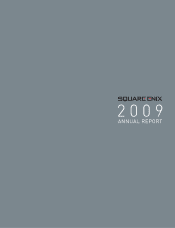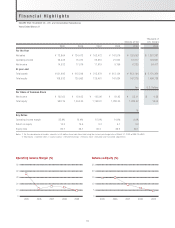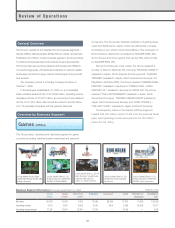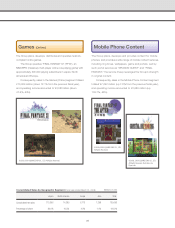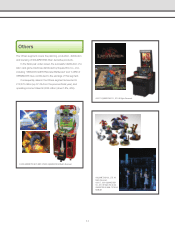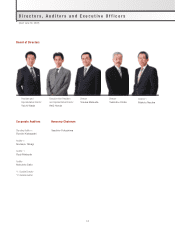Square Enix 2009 Annual Report Download - page 8
Download and view the complete annual report
Please find page 8 of the 2009 Square Enix annual report below. You can navigate through the pages in the report by either clicking on the pages listed below, or by using the keyword search tool below to find specific information within the annual report.
Review of Operations
Game Entertainment becomes Mainstream
Computer games had their first boom around thirty years ago
through the emergence of arcade games. More than twenty
years ago, Nintendo’s Family Computer (or NES) game console
became a major hit product in Japan, ushering in an era of
intense competition in the home game console market. Game
consoles spread in popularity to North America in the second
half of the 1990s and subsequently to Europe at the beginning
of this decade, eventually leading to global market penetration.
During this time, PC-based computer games steadily
strengthened their footing in Europe and North America, while
online games achieved a breakthrough in popularity in the Asia
region from the second half of the 1990s, particularly centered
on South Korea and China. Since 2000, as the functionality of
mobile phones has advanced, the range of games played on
mobile phones has also expanded rapidly.
In terms of demographic spread, although computer games
started out mainly as entertainment aimed at children, over the
industry’s thirty-year history it has evolved into a popular enter-
tainment genre for adults too.
Games have spread their popularity from almost any
perspective one might choose—geographically, across age
groups, and to a wide variety of platforms. Games have become
a mainstream genre of global entertainment.
The game industry has now grown to become one of the
world’s major industries, with continuing growth expected in the
future. Consequently, as an industry participant, we must take all
possible measures to serve the game market as one of the world’s
most sophisticated markets. I believe such efforts will be rewarded.
Eidos Ltd. joins the SQARE ENIX Group
Since the reach of the game industry is global, we must also
become a truly global business. We need to establish game
development studios in multiple locations around the world and
transform our sales and marketing organization in each region
from a mere outpost agency of Japan-based headquarters to
one that has firm roots in the local market.
In April 2009, as our first move aimed at forging more
globalized operations, we acquired Eidos Ltd. as a wholly
owned subsidiary. The acquisition price was £84.3 million (¥12.1
billion as of the purchase date).
Three main reasons contributed to our decision that Eidos
would make a suitable member of the SQUARE ENIX Group.
Firstly, Eidos has proven its extremely high game develop-
ment capabilities. The company boasts a strong lineup of
high-quality content, including such major franchises as “Tomb
Raider“ (more than 30 million units shipped) and “Hitman” (over
8 million units shipped).
Secondly, among major European and North American
game publishers, Eidos is one of the few companies to own
nearly all of it titles’ IP outright. From the perspective of our core
strategy of establishing a diverse range of customer points of
contact, this is particularly significant.
Thirdly, Eidos has a corporate culture that emphasizes the
importance of what we in Japan refer to as “monozukuri”—a
passion for the art and science of producing high-quality products.
This also fits closely with our philosophy. Eidos places importance
on the world view articulated through its products. The com-
pany’s culture of pursuing the richest game experience possible
*Eidos Game Studios includes the Eidos Hungary Studio (Battlestations: Pacific) and the management of all external studio projects such as Rocksteady Studios
(Batman: Arkham Asylum) and Avalanche Studios (Just Cause 2). Eidos owns 25% of Rocksteady Studios.
Eidos studios and its major titles
Crystal Dynamics United States Tomb Raider : Underworld (Published in November 2008)
Hitman : Blood Money (Published in May 2006)
IO Interactive Denmark Kane & Lynch : Dead Men (Published in November 2007)
Mini Ninjas (In development, September 2009)
Eidos Montréal Canada
Deus Ex 3 (In development, TBA)
Thief 4 (In development, TBA)
Beautiful Game Studios United Kingdom
Championship Manager 10 (In development, September 2009)
Eidos Game Studios* United Kingdom
Just Cause 2 (In development, 2010)
Battlestations : Pacific (Published in May 2009)
06

